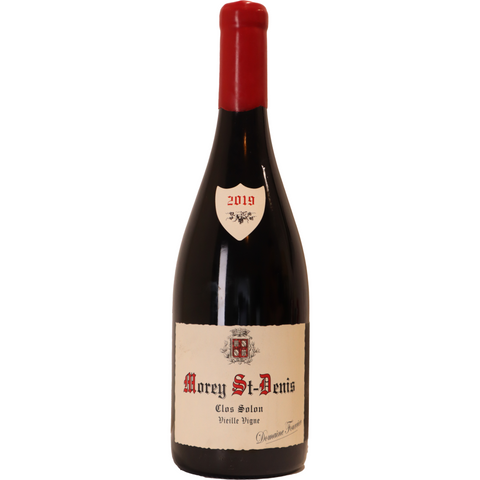
2019 Domaine Fourrier Morey Saint Denis “Clos Solon” Vieille Vigne, Burgundy, France
The lavender-spiced blackberry fruit displays a darker tone than the Chambolle-Musigny, with slightly firmer and more overt tannins. On the other hand, this Morey village wine brings cutting, fresh acidity and tart energetic fruits.
ABOUT THIS WINE
Working with Mother Nature, intervening as little as possible in order to allow the vines, the terroir and the vintage to express themselves, is the basis of Jean Marie’s winemaking philosophy. To capture the individual, unique expression of terroir in his wines, he vinifies each vineyard separately, not only the premier and grand crus. A cold soak of 3 to 4 days prior to fermentation allows gentle extraction of color and aromatic phenols. Fourrier avoids the use of sulfur dioxide in his wines, preferring to use temperature, CO2 and lees contact to preserve them. No more than 20% new oak is used in order to preserve the purity of the fruit and the personality of each wine.
“Oak is for slow breathing of the wine, not for taste,” Jean-Marie emphasizes. Additionally, older barrels exchange gases much more slowly, thereby naturally protecting the wine against oxidation. The malolactic fermentation is allowed to proceed at its own rate. Jean-Marie believes that the longer the malolactic takes to finish, the greater the aging potential of the wine. He likes to leave the wines on the fine lees until bottling which usually occurs 18 to 20 months after harvest. He bottles, in some cases straight from the cask, without fining or filtering the wines, preferring to allow the dissolved CO2 to remain in the wine as protection rather than risk the addition of SO2 in deference to “modern market requirements”. What ends up in the glass is a pure expression of terroir with as little interference as possible by the winemaker. Domaine Fourrier’s wines possess superb balance, enchanting elegance, finesse and complexity.
ABOUT THIS PRODUCER
The Domaine Fourrier (previously known as Pernot-Fourrier) has a long history in Gevrey Chambertin extending over four generations. The estate was founded by Fernand Pernot during the 1930s and 1940s. Unmarried and childless, he enlisted the aid of his nephew, Jean-Claude Fourrier, who then took the reins of the domaine in 1969. One of the first domains to actually export its wine to the USA, it is also one of the most well-endowed estates in the village with holdings throughout the most heralded appellations. Having weathered a period of eclipse through the latter part of the 1980s, the domain was re-energized in 1994 upon the arrival of Jean-Marie Fourrier, son of Jean-Claude. Jean-Marie burst on the Burgundian scene by wisely combining the traditions of his father and uncle (using, for example, vines of a minimum 30 years of age for the estate bottlings), his experience gained while working with Henri Jayer and the Domaine Drouhin (in Oregon), and his own clear sense of style. Ever since his ascension, the wines of Domaine Fourrier have garnered critical acclaim. He now works the domaine with the assistance of his sister, Isabelle, and his wife, Vicki.
We arrived at the doorstep of Domaine Fourrier virtually simultaneously with Jean-Marie’s return to the domaine. We were referred to him by our mutual friend and acquaintance, Romain Lignier of Domaine Hubert Lignier in Morey Saint Denis. The wines of Domaine Fourrier have been part of our catalogue commencing with the 1994 vintage and we represent this estate on an exclusive basis for the United States (as is the case with virtually all producers in our portfolio).
The Domaine Fourrier owns 9 hectares of vineyards spread amongst the communes of Gevrey-Chambertin, Morey-St.-Denis, Chambolle-Musigny and Vougeot. The holdings are scattered up and down the slopes and range from village to Grand Cru level. Included among the holdings are important parts of “Clos St. Jacques” and “Combes Aux Moines” as well as a small but valuable slice of Griottes Chambertin. The impeccably tended vineyards are composed of vines of an average age between 50 and 70 years old. “Until a vineyard develops a root system, it doesn’t develop flavor”, says Jean-Marie. Thus, wines made from any vines less than 30 years old are sold to négociants rather than being bottled at the domaine. Sélection massale (use of cuttings from their own vines) is the only method used to replace missing or failing vines. Commercial clones specifically selected for disease resistance or high yield have no place here. Respect for terroir is a paramount principle. Chemical fertilizers are not used and treatments to combat fungus and insects are applied only when absolutely necessary. Jean Marie does not blindly follow the theory that lower yields automatically equate with higher quality. To control production, he severely prunes his vines in the winter, but does not, as a rule, practice green harvesting, preferring to rely on a process of de-budding. Achieving natural balance between yield and vine growth as a function of each season’s growing conditions is Fourrier’s key objective. The pickers are instructed to eliminate any unsound grapes in the vineyard before the bunches go into the baskets. In this way, the grapes going into the tanks are completely uncontaminated, yielding clean lees which allows for an extensive aging on the lees without racking.
Details:
| Grape(s) | Pinot Noir |
| Farming | Organic |
